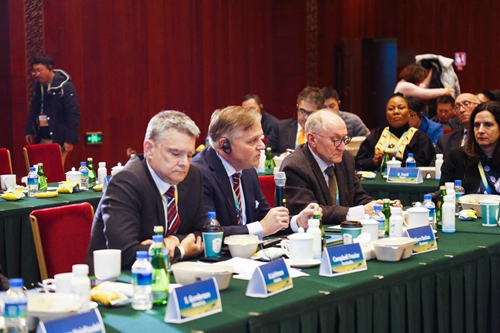Chinese officials rebuke journal organ donation data accusation
WHO expert backs China’s data, shrugs off scholars’ ‘opinion’

Huang Jiefu, head of the China National Organ Donation and Transplantation Committee, speaks at the Symposium on Development of Organ Donation and Transplantation held in Kunming, capital of Southwest China's Yunnan Province on Saturday. Photo: Courtesy of the organizer
China's leading organ transplant scholar rebuked a report published in a peer-reviewed medical journal criticizing China's organ donation data, saying the report is laden with logical and academic fallacies.Wang Haibo, head of China Organ Transplant Response System (COTRS), the country's official organ distribution system, said that China will lodge a formal rebuttal to the journal BMC Medical Ethics questioning how such a paper came to be published.
During the Symposium on Development of Organ Donation and Transplantation in China in Kunming, capital of Southwest China's Yunnan Province on Saturday, Wang referred to the medical journal report as a "serious accusation, and China felt the need of response."
The paper published by Jacob Lavee, an Israeli scientist, Matthew Robertson and Raymond Hinde, Australian doctoral students, claimed China generated fake organ donation data using a simple mathematical equation.
The researchers claimed the quadratic equation produces an upward swing and that the data could be easily falsified.
In response, Wang showed slides drawn from data from the US, Brazil and Iran on the WHO website: All fit the binomial equation that gives an upward swing. Data from other countries also closely matches the equation, he noted.
"Every countries' data can fit into an equation, because the equation is generated from the data," Wang said. If the China's organ donation data was generated by the equation, then any four-year number would fit the equation, Wang said.
But through cooperation with mathematicians of Peking University, Wang and his team found that any four-year number from China's organ data generates different equations.

Foreign specialists at the Symposium on Development of Organ Donation and Transplantation held in Kunming, capital of Southwest China's Yunnan Province on Saturday. Photo: Courtesy of the organizer
This powerfully disproves Lavee's report, Wang declared.Wang outlined how the organ donation data system works to more than 100 specialists from more than 30 countries including Germany, the Vatican, the US and Australia.
When a donor's name is typed into the system, up comes his or her personal information, China national identify card number, consent details and other pertinent information.
The allocation process of the system is real-time and supervised by institutes including transplant hospitals and the Red Cross, Wang said.
Huang Jiefu, head of the China National Organ Donation and Transplantation Committee and chairman of the China Organ Transplantation Development Foundation, said that he felt "sorry for Lavee" as the latter could have spent more time on organ transplantation to save people in his country.
"I was invited by the Israeli Ambassador to China several times to introduce China's experience on organ donation and transplantation reform, which I believe is the best rebuttal for Lavee," Huang said.
Jose Núñez, in charge of the transplantation program at the World Health Organization, told the Global Times that they received the report produced by Lavee and it was sent to them repeatedly twice a week.
"But we didn't respond," said Núñez, noting that China has already provided efficient data to the Global Observatory on Donation and Transplantation.
Núñez said there was nothing that cast doubt on China's data.
"So anything that comes from the magazine or the scientific journal is just his or her opinion," he said.
Chinese experience hailed
Huang the foundation chairman said that the malicious attacks proved China's organ donation and transplantation work was achieving great success worldwide.
"Otherwise, no one would bother to attack it," Huang said.
The official Chinese data documents 2,766 organ donations in 2015, 4,080 in 2016, 5,146 in 2017 and 6,302 in 2018. The number of organ donations in 2018 ranked second in the world.
Since the establishment of a green channel for organ transport three years ago, the transfer time for organs has been shortened by an average of 1 to 1.5 hours and the overall organ sharing rate has increased by 7.3 percent, the Chinese mainland data showed.


